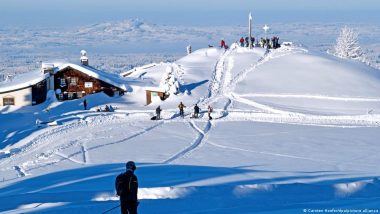Lack of snowfall is posing a growing risk for winter sports tourism. Ski restorts are tryting to adapt.Anton Bodner was relieved when it snowed heavily in Kitzbühel, Austria, just in time for the start of the ski season. "This has taken a lot of pressure off," says the CEO of Bergbahn AG Kitzbühel, which operates 57 lifts around the small Austrian ski resort town. When there's snow, the lifts transport around 1.5 million tourists each winter. "This year, nature gifted us this good start to the season — one which we haven't had for a long time."
Also Read | India News | Significant Links Between Early-life Diseases and Childlessness Revealed in a New Study.
Despite the strong start of the ski season in Kitzbühel, the consequences of climate change are clear to see in the Alps. Rising temperatures are causing glaciers to melt, and that means less snow, making ski tourism an increasingly unpredictable business. In Kitzbühel, for example, during the famous Hahnenkamm ski race this past January, skiers raced down the legendary challenging ski run known as the "Streif" on artificial snow. Brown meadows flanked both sides of the snowy strip.
Also Read | Entertainment News | Ajay Devgn to Sonam Kapoor, Celebs Wish ‘Tiger’ Salman Khan on 58th Birthday.
Receding snow line
"Of course we are aware of climate developments," says Bodner. "It would be crazy not to be." He assumes that the snow line, the level on a mountain above which snow is found for most of the year, will recede by around 200 meters (656 ft) by 2050. But thanks to the possibility of making artificial snow "there will still be skiing in Kitzbühel in decades to come," says Bodner. He does not believe the ski tourism will vanish in the area.
Robert Steiger, from the institute of finance at the University of Innsbruck, has been studying the effects of climate change on the industry for years. He is currently working on the basis of the most pessimistic climate scenario. According to this scenario, 80% of ski resorts in the Austrian Alps will still have enough snow in 2050 — although it won't be all natural snow. He says there will be an increase in water use of up to 100% to account for artificial snowmaking. "There will be some ski resorts that will still function at the end of the century," he says. "For others, however, it will already be difficult in 20 years."
The consequences of climate change vary
First and foremost, operators need to be aware of climate-related risks. The specific impact of climate change varies from case to case and it is not possible to make blanket statements about what can be done to mitigate change. "However, it has to be said that most destinations are primarily concerned with how they can safeguard their snow-related business," says Steiger.
The vast majority of providers are focusing on guests on skiing holidays and providing artificial snow, says Werner Bätzing, a professor emeritus of cultural geography at the University of Erlangen-Nuremberg.
Ski vacationers bring in significantly more money than other holidaymakers. Plus, as the market shrinks, competition between providers is increasing. "This is leading to merciless cut-throat competition," says Bätzing.
Alpaca hikes
The fact that many Alpine destinations continue to rely on ski tourism is due to the fact that demand for winter breaks remains high and a lack of snowfall can still be offset through artificial snowmaking.
Yet many are calling for change. The aim of the EU-funded Beyond Snow project is to encourage a rethink in the industry. "For many cable car companies, climate change is still a taboo subject," says Giovanni Vassena of Alpine Pearls, an organization that represents various Alpine destinations that focus on soft tourism.
The municipality of Werfenweng near Salzburg, for example, offers alpaca hikes, toboggan runs and horse-drawn carriage rides — alongside stellar ski slopes.
Other regions accept they are increasingly dependent on artificial snow. Every January, Ruhpolding in Bavaria hosts the Biathlon World Cup. Gregor Matjan, CEO of the city's tourism board, says they are well aware of the possibility that each year brings less snowfall. Their solution is to rely on artificial snow to prepare cross-country ski trails used by tourists. "I assume that this will continue to be the case for at least the next decade," says Matjan. Other regions are creating ski trails made of plastic mats which could make cross-country skiing a year-round activity.
"We are thinking very hard about how our tourism model needs to change," says Kitzbühel cable car company CEO Anton Bodner. The resort town is currently considering creating tourism offerings outside the winter season, which could include mountain tours on electric bikes, among other activities. At the moment, however, Bodner and others are simply hoping for colder temperatures and fresh snowfall.
This article was translated from German.
(The above story first appeared on LatestLY on Dec 27, 2023 05:40 PM IST. For more news and updates on politics, world, sports, entertainment and lifestyle, log on to our website latestly.com).













 Quickly
Quickly




















